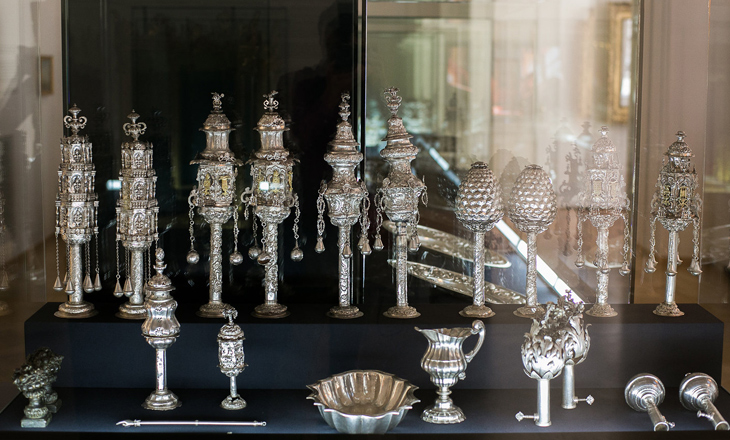
 |
| Italian Word of the Week: GHETTO |
| by Daniela
Gross The word “ghetto” is so familiar for an Italian Jew. Since your childhood you know what the ghetto is, where it is and often you grow up playing in the maze of its narrow streets. The term is related to the Ghetto of Venice, the first one instituted in Europe in 1516. From there, the word spread through the continent indicating the area where the Jews had to live, restricted by law, separated from the rest of population. The ghettos were abolished during the XIX century, also following the ideals of the French Revolution, and the last ghetto to be suppressed in Western Europe was that of Rome, in 1870, when the city was annexed to Reign of Italy. Now, while the 500 years of the Venetian Ghetto are approaching (the celebration for the anniversary, next year, already began) historians reflect on what that period really meant in the Jewish history. But in the everyday life of Italian Jews, Ghetto has definitely lost the meaning of separation and mostly is no longer the place where Jews live. That ancient district is now one of the poles of the Jewish Community life, even if the synagogues built after the Emancipation stand outside its walls. It is a familiar place, which testifies the glorious and troubled history of the Italian Jews. It hosts events, shops, restaurants, has a strong appeal on the tourists (especially in Venice and in Rome) and, with its atmosphere, its old fascinating houses and its central location, it is often an amazing place to inhabit. As for me, I dream of living in those magnificent palaces in Portico d’Ottavia, in the Ghetto of Rome: one of the most beautiful places in the Eternal City. |






This newsletter is published under difficult conditions. The editors of this newsletter are Italian journalists whose native language is Italian. They are willing to offer their energy and their skills to give international readers the opportunity of learning more about the Italian Jewish world, its values, its culture and its traditions.
In spite of all our efforts to avoid this, readers may find an occasional language mistake. We count on your understanding and on your help and advice to correct these mistakes and improve our publication.
Pagine Ebraiche International Edition is published by the Union of Italian Jewish Communities (UCEI). UCEI publications encourage an understanding of the Jewish world and the debate within it. The articles and opinions published by Pagine Ebraiche International Edition, unless expressly stated otherwise, cannot be interpreted as the official position of UCEI, but only as the self-expression of the people who sign them, offering their comments to UCEI publications. Readers who are interested in making their own contribution should email us at desk@ucei.it
You received this newsletter because you authorized UCEI to contact you. If you would like to remove your email address from our list, or if you would like to subscribe using a new email address, please send a blank email to desk@ucei.it stating "unsubscribe" or "subscribe" in the subject field.
© UCEI - All rights reserved - The articles may only be reproduced after obtaining the written permission of the editor-in-chief. Pagine Ebraiche - Reg Rome Court 199/2009 – Editor in Chief: Guido Vitale - Managing Editor: Daniela Gross.
Special thanks to: Francesco Moises Bassano, Susanna Barki, Monica Bizzio, Benedetta Guetta, Gadi Luzzatto Voghera, Francesca Matalon, Giovanni Montenero, Elèna Mortara, Giandomenico Pozzi, Daniel Reichel, Adam Smulevich, Simone Somekh, Rossella Tercatin, Ada Treves.
Questo notiziario è realizzato in condizioni di particolare difficoltà. I redattori di questo notiziario sono giornalisti italiani di madrelingua italiana. Mettono a disposizione le loro energie e le loro competenze per raccontare in lingua inglese l'ebraismo italiano, i suoi valori, la sua cultura e i suoi valori. Nonostante il nostro impegno il lettore potrebbe trovare errori e imperfezioni nell'utilizzo del linguaggio che faremo del nostro meglio per evitare. Contiamo sulla vostra comprensione e soprattutto sul vostro aiuto e sul vostro consiglio per correggere gli errori e migliorare.
Pagine Ebraiche International Edition è una pubblicazione edita dall'Unione delle Comunità Ebraiche Italiane. L'UCEI sviluppa mezzi di comunicazione che incoraggiano la conoscenza e il confronto delle realtà ebraiche. Gli articoli e i commenti pubblicati, a meno che non sia espressamente indicato il contrario, non possono essere intesi come una presa di posizione ufficiale, ma solo come la autonoma espressione delle persone che li firmano e che si sono rese gratuitamente disponibili. Gli utenti che fossero interessati a offrire un proprio contributo possono rivolgersi all'indirizzo desk@ucei.it
Avete ricevuto questo messaggio perché avete trasmesso a Ucei l'autorizzazione a comunicare con voi. Se non desiderate ricevere ulteriori comunicazioni o se volete comunicare un nuovo indirizzo email, scrivete a: desk@ucei.it indicando nell'oggetto del messaggio "cancella" o "modifica".
© UCEI - Tutti i diritti riservati - I testi possono essere riprodotti solo dopo aver ottenuto l'autorizzazione scritta della Direzione. Pagine Ebraiche International Edition - notiziario dell'ebraismo italiano - Reg. Tribunale di Roma 199/2009 - direttore responsabile: Guido Vitale - Coordinamento: Daniela Gross.
Realizzato con il contributo di: Francesco Moises Bassano, Susanna Barki, Monica Bizzio, Benedetta Guetta, Gadi Luzzatto Voghera, Francesca Matalon, Giovanni Montenero, Elèna Mortara, Giandomenico Pozzi, Daniel Reichel, Adam Smulevich, Simone Somekh, Rossella Tercatin, Ada Treves.








